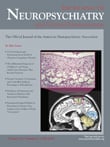New-Onset Psychosis After Temporal Lobectomy
To the Editor: Epilepsy is often associated with psychiatric illness such as depression, anxiety, and ictal, interictal, and postictal psychosis. Temporal lobectomy for treatment of seizures resistant to medication is rarely associated with new-onset psychotic disorders. 1 We report on a young man who developed psychosis after right temporal lobectomy was performed for seizure control.
A 35-year-old man was brought to the psychiatry outpatient department with complaints of irritability, violence at home, aggressiveness, and delusions of reference and persecution for 3 days. He had been treated at another hospital for complex partial seizures, which was poorly controlled on antiepileptic medications. MRI brain scans before the surgery showed right hippocampal sclerosis and EEG showed seizure activity from the right temporal region. The patient had undergone right temporal lobectomy 4 months before the onset of psychotic symptoms. The patient did not have any seizures after the surgery and was well maintained on medications; he had been taking carbamazepine, topiramate, and clonazepam before the surgery, and they were continued. Long periods of intractable seizures preoperatively were never associated with ictal, postictal, or interictal psychosis. No new antiepileptic medications or other propsychotic medications were added; withdrawal of antiepileptic medications was not attempted. He was admitted and treated with haloperidol, 10 mg/day in divided doses, and parenteral haloperidol as required for the first 2 days. Because of persisting aggression and delusions, the dose was increased to 20 mg/day along with promethazine, 20 mg/day. The patient improved over the next 2 weeks on these medications and his violence and irritability decreased. Three weeks after admission he was discharged with haloperidol, 20 mg/day in divided doses, and was asymptomatic on follow-up.
To date, only a little more than 50 patients have been reported to have de novo psychosis following surgical treatment for medically intractable epilepsy. 1 Approximately 85% of the de novo postoperative psychoses have followed right temporal lobectomies. 2 Psychosis after temporal lobectomy has been shown to have a clustering in the early postoperative period. Most of the reported cases occurred within 6 months of the surgery. 2 The presence of bilateral abnormalities, congenital lesions and pathologies other than mesial temporal lobe sclerosis have been associated with de novo onset of psychosis after the surgery. 1 , 2 , 3 Patients with bilateral functional and structural abnormalities, particularly of the amygdala, are at particular risk. 1 The various cases that have been reported suggest schizophrenia-like psychosis in these patients, who respond well to treatment with antipsychotics. Long-term studies on these patients are lacking and prognostic factors, if any, are still unknown. Any changes in the medications or recurrence of seizures can also precipitate psychosis. New-onset postictal psychosis after temporal lobectomy has also been described. 4 , 5 Antipsychotics that are not likely to lower the seizure threshold must be chosen for such patients. The physicians should be aware of the rare possibility of psychosis in patients undergoing surgery for seizures resistant to medical therapy.
1 . Shaw P, Mellers J, Henderson M, et al: Schizophrenia-like psychosis arising de novo following a temporal lobectomy: timing and risk factors. J Neurol Neurosurg Psychiatry 2004; 75:1003–1008Google Scholar
2 . Blumer D, Wakhlu S, Davies K, et al: Psychiatric outcome of temporal lobectomy for epilepsy: incidence and treatment of psychiatric complications. Epilepsia 1998; 39:478–486Google Scholar
3 . Christodoulou C, Koutroumanidis M, Hennessy MJ, et al: Postictal psychosis after temporal lobectomy. Neurology 2002; 59:1432–1435Google Scholar
4 . Manchanda R, Miller H, McLachlan RS: Postictal psychosis after right temporal lobectomy. J Neurol Neurosurg Psychiatry 1993; 56:277–279Google Scholar
5 . Mace CJ, Trimble MR: Psychosis following temporal lobe surgery: a report of six cases. J Neurol Neurosurg Psychiatry 1991; 54:639–644Google Scholar



